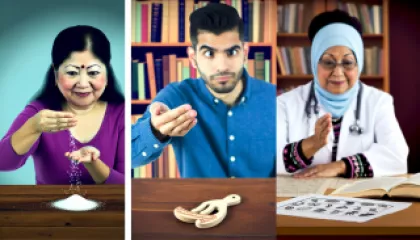Mastering the Mind: The Ultimate Guide to Understanding Superstitions in Psychology
Superstitions, those seemingly irrational beliefs in supernatural influences affecting our lives, are a fascinating part of human psychology. From avoiding walking under ladders to throwing salt over one's shoulder, superstitions vary widely across cultures yet share common psychological roots. This guide will delve into the psychology behind these beliefs, offering insights into why we hold onto them and how they affect our behavior.
Understanding Superstitions
First and foremost, it is crucial to understand what superstitions are. They are typically defined as irrational beliefs in supernatural forces that can affect our lives in specific ways. While they may seem illogical, they are deeply ingrained in many cultures and societies worldwide. To explore the psychology behind superstitions, it’s essential to first understand these beliefs' nature and origins.
The Origin of Superstitions
Superstitions have been part of human societies for centuries, often arising from attempts to make sense of the unknown. In the absence of scientific explanations, people often turned to supernatural forces to explain phenomena they could not understand. Over time, these beliefs solidified into superstitions, passed down through generations and becoming part of cultural heritage.
The Variety of Superstitions
Superstitions can take many forms, from actions (like knocking on wood) to objects (like a rabbit's foot) or numbers (like the number 13). They differ significantly across cultures, reflecting diverse historical contexts, religious beliefs, and communal experiences. Despite their variety, all superstitions share the characteristic of attributing certain outcomes to specific actions or circumstances, often not based on logical or scientific reasoning.
The Psychology Behind Superstitions
Now that we understand what superstitions are and where they come from, let's delve into the psychology behind them. Various psychological theories and phenomena can explain why people hold onto superstitions, despite their irrationality.
Illusory Correlation
The concept of illusory correlation is central to understanding superstitious beliefs. This psychological phenomenon refers to the tendency to perceive a relationship between two unrelated events. For instance, if you wear a particular shirt on a day you perform well at work, you might associate that shirt with good performance, even if there's no actual connection. This perceived correlation fuels many superstitions.
Operant Conditioning
Operant conditioning, a concept developed by psychologist B.F. Skinner, also plays a significant role in superstition. According to this theory, behaviors followed by positive outcomes are likely to be repeated, while those followed by negative outcomes are less likely to recur. This principle can explain why certain superstitious rituals persist over time.
Cognitive Bias
Another psychological factor contributing to superstitions is cognitive bias. Cognitive biases are systematic errors in thinking that affect the decisions and judgments we make. In the case of superstitions, confirmation bias (a tendency to search for, interpret, and recall information in a way that confirms one's preexisting beliefs) often comes into play, reinforcing superstitious beliefs.
Impact of Superstitions on Behavior
Understanding the psychology behind superstitions provides insight into how these beliefs affect behavior. From influencing decisions to altering perceptions, superstitions can have a profound impact on how people navigate their lives.
Influence on Decision-Making
Superstitions can significantly influence decision-making. For example, someone who believes in the "bad luck" of the number 13 might avoid staying on the 13th floor of a hotel or setting a meeting for the 13th of the month. These beliefs can shape choices in both minor and major ways.
Perception of Control
Superstitions also affect our perception of control. In uncertain or high-stakes situations, people often turn to superstitious rituals to feel a sense of control over the outcome. This can be seen in athletes who follow specific pre-game rituals, believing that these actions will influence their performance.
Conclusion: Mastering the Mind
Understanding the psychology behind superstitions offers a fascinating glimpse into the human mind. While these beliefs may seem irrational, they reveal our attempts to make sense of the world, our desire for control, and our cognitive biases. By recognizing these psychological underpinnings, we can better understand why superstitions persist and how they shape our behaviors and decisions.
Mastering the mind involves acknowledging these irrational beliefs, understanding their origins, and considering their impact on our behavior. As we do so, we gain a deeper understanding of ourselves and others, leading to greater empathy and insight. The study of superstitions, therefore, is not just about debunking irrational beliefs, but about exploring the intricacies of the human mind and its quest to navigate an uncertain world.








